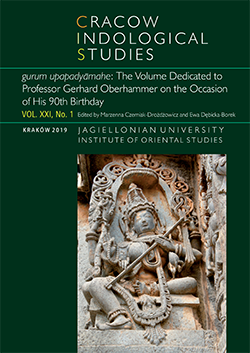On Pre-reflectivity of Self-consciousness in the Traditions of Advaita and Viśiṣṭādvaita Vedānta
On Pre-reflectivity of Self-consciousness in the Traditions of Advaita and Viśiṣṭādvaita Vedānta
Author(s): Marcus SchmückerSubject(s): Cultural history, Social history
Published by: KSIĘGARNIA AKADEMICKA Sp. z o.o.
Keywords: prereflectivity; self-consciousness; self-knowledge; self-illumination; familiarity; difference; self-contradiction; substance (dravya); state (avasthā); qualifying knowledge (dharmabhūtajñāna)
Summary/Abstract: By pointing out different forms of pre-reflective consciousness and comparing them to the concepts of self in Advaita and Viśiṣṭādvaita Vedānta, it could be shown that both schools apply a kind of consciousness that corresponds to Frank’s concept of self-consciousness and self-knowledge. As demonstrated, the first form of pre-reflective consciousness complies with the advaitic teaching of an unchangeable eternity of consciousness, which is subjectless and understood as being without time and space, even as being omnipresent. It appears impossible to relate it to something else without it being objectified. The Viśiṣṭādvaita Vedānta school reinterprets the concept of pure consciousness and accepts it as objectifiable consciousness, which is now considered “knowledge”. At the same time it presupposes a kind of individual consciousness which is called “I”. Moreover, this school uses the argument that consciousness is unobjectifiable against the Advaitin to establish that objectifying does not imply the cessation of consciousness, that is, in their case the consciousness of the individual self. Rāmānuja thus theorises, a thesis continued by Veṅkaṭanātha, that knowledges (saṃvit) can be remembered over time because, first, they are based on a constant self, that is, a pre-reflective “I”-consciousness, and secondly, through this “knowledge”, they can be known again by referring to itself in another state (avasthā) than it earlier held. But what does this mean for the familiarity of (self‑)consciousness? Is it mediated? The self, the “I”-consciousness, is always in a new, changed state of knowledge. As far as self-luminosity is possible, even if the self can be objectified, it is possible to say, without negating consciousness, that it is immediately aware of being in a special state if this can be proven through different means of knowledge.
Journal: Cracow Indological Studies
- Issue Year: 21/2019
- Issue No: 1
- Page Range: 209-245
- Page Count: 37
- Language: English

